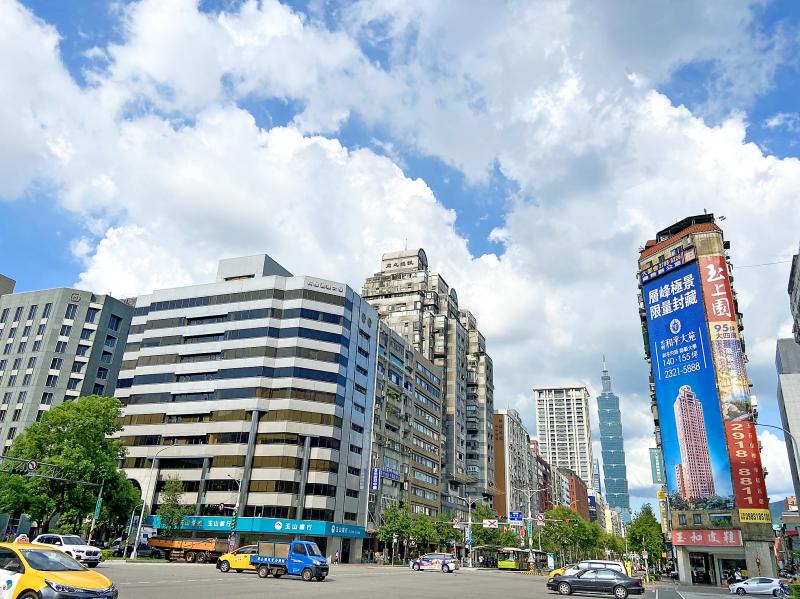Housing transactions last month slumped 40 percent from May, as a level 3 COVID-19 alert chilled buying interest and caused inconvenience for house hunting, major real-estate brokers said yesterday.
Evertrust Rehouse Co (永慶房屋), Taiwan’s largest real-estate broker by number of offices, reported a 37 percent decline in sales, with the retreat most evident in New Taipei City, a hot spot of domestic COVID-19 inflections.
Evertrust research department deputy head Chen Chin-ping (陳金萍) said that movement restrictions, and the ban on indoor gatherings of five people or more caused inconvenience for house hunting as buildings with security guards generally turned away visitors.

Photo: Hsu Yi-ping, Taipei Times
Sales of units in older buildings remained relatively strong, as access to buildings without security guards was less of an issue, Chen said.
However, sentiment appeared to have stabilized in the second half of last month after the daily number of domestic cases fell below 100, she said.
However, a cluster infection with the more infectious Delta variant of SARS-CoV-2 in Pingtung County continued to create uncertainty, Chen said, declining to speculate on the timing of the expected recovery.
The third quarter is traditionally a low sales season, with Ghost Month falling mostly in August this year, she said.
The market also needs to assimilate to the increased property tax rates of 35 to 45 percent for units resold within five years of purchase, she said, adding that the measure would take effect today.
H&B Realty Co (住商不動產), Taiwan’s largest real-estate broker by number of franchises, said that its housing transactions nosedived 35.1 percent.
The decline is sharpest in Taipei, at 41.8 percent, as residents have refrained from going out to help curb the spread of the virus, H&B Realty research manager Jessica Hsu (徐佳馨) said.
Hsu said she was uncertain whether the virus outbreak might have deprived sellers from placing their property on the market before the higher taxes take effect.
Mandy Lang (郎美囡), a researcher at H&B Realty-affiliated Great Home Realty Co (大家房屋), said that this month’s data would reveal how the market fares, as low interest rates and ample liquidity continue to back the market.
Chinatrust Real Estate Co (中信房屋) said that its sales plunged 39.6 percent, with decreases in Taipei and New Taipei City of 40.9 percent and 53.8 percent respectively.
In other municipalities, sales were down about 35 percent, as domestic cases were concentrated in northern Taiwan, it said.

With an approval rating of just two percent, Peruvian President Dina Boluarte might be the world’s most unpopular leader, according to pollsters. Protests greeted her rise to power 29 months ago, and have marked her entire term — joined by assorted scandals, investigations, controversies and a surge in gang violence. The 63-year-old is the target of a dozen probes, including for her alleged failure to declare gifts of luxury jewels and watches, a scandal inevitably dubbed “Rolexgate.” She is also under the microscope for a two-week undeclared absence for nose surgery — which she insists was medical, not cosmetic — and is

CAUTIOUS RECOVERY: While the manufacturing sector returned to growth amid the US-China trade truce, firms remain wary as uncertainty clouds the outlook, the CIER said The local manufacturing sector returned to expansion last month, as the official purchasing managers’ index (PMI) rose 2.1 points to 51.0, driven by a temporary easing in US-China trade tensions, the Chung-Hua Institution for Economic Research (CIER, 中華經濟研究院) said yesterday. The PMI gauges the health of the manufacturing industry, with readings above 50 indicating expansion and those below 50 signaling contraction. “Firms are not as pessimistic as they were in April, but they remain far from optimistic,” CIER president Lien Hsien-ming (連賢明) said at a news conference. The full impact of US tariff decisions is unlikely to become clear until later this month

GROWING CONCERN: Some senior Trump administration officials opposed the UAE expansion over fears that another TSMC project could jeopardize its US investment Taiwan Semiconductor Manufacturing Co (TSMC, 台積電) is evaluating building an advanced production facility in the United Arab Emirates (UAE) and has discussed the possibility with officials in US President Donald Trump’s administration, people familiar with the matter said, in a potentially major bet on the Middle East that would only come to fruition with Washington’s approval. The company has had multiple meetings in the past few months with US Special Envoy to the Middle East Steve Witkoff and officials from MGX, an influential investment vehicle overseen by the UAE president’s brother, the people said. The conversations are a continuation of talks that

CHIP DUTIES: TSMC said it voiced its concerns to Washington about tariffs, telling the US commerce department that it wants ‘fair treatment’ to protect its competitiveness Taiwan Semiconductor Manufacturing Co (TSMC, 台積電) yesterday reiterated robust business prospects for this year as strong artificial intelligence (AI) chip demand from Nvidia Corp and other customers would absorb the impacts of US tariffs. “The impact of tariffs would be indirect, as the custom tax is the importers’ responsibility, not the exporters,” TSMC chairman and chief executive officer C.C. Wei (魏哲家) said at the chipmaker’s annual shareholders’ meeting in Hsinchu City. TSMC’s business could be affected if people become reluctant to buy electronics due to inflated prices, Wei said. In addition, the chipmaker has voiced its concern to the US Department of Commerce